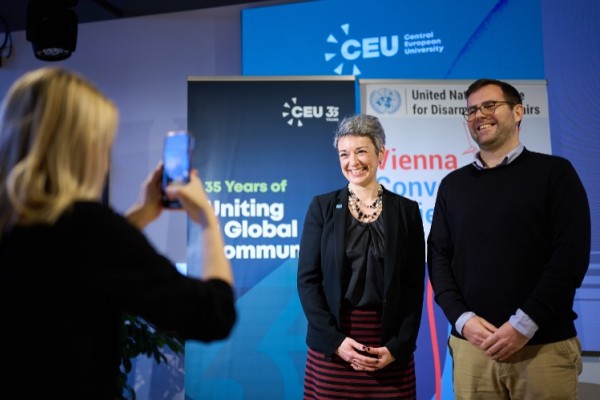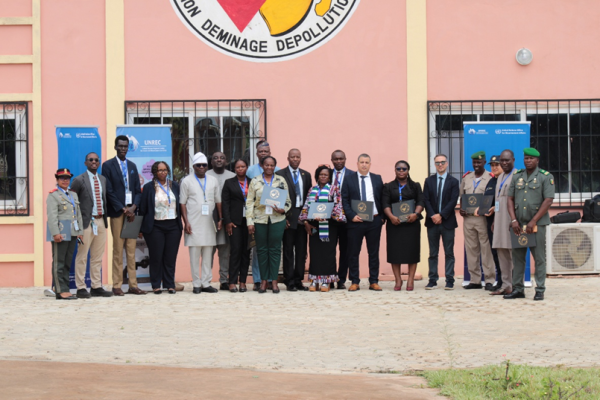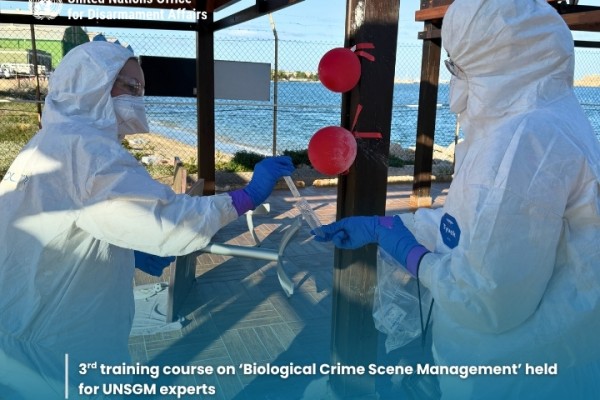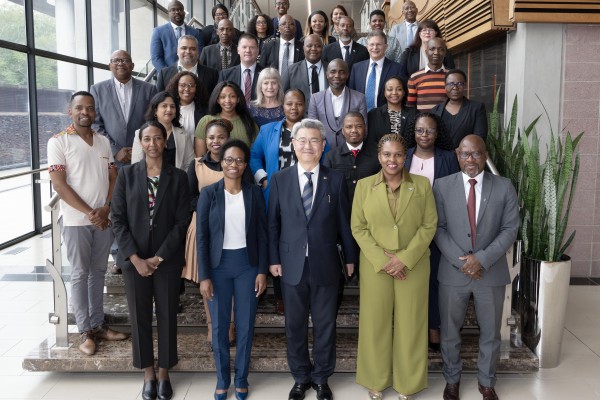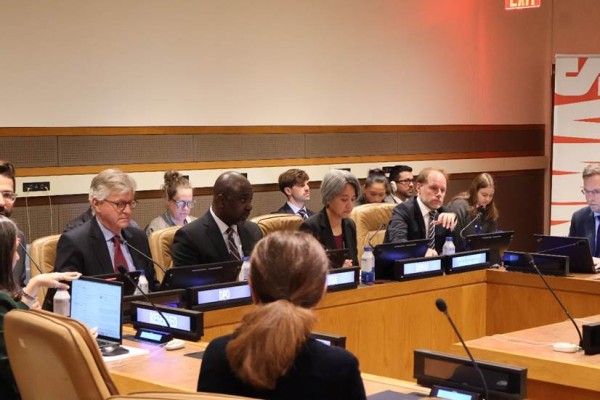Le Bureau des Nations Unies pour les affaires de désarmement (UNODA) a soutenu le Botswana et l'Afrique du Sud dans l'organisation d'un exercice d'assistance entre pairs visant à renforcer les mesures de contrôle des exportations et des frontières dans le cadre de la résolution 1540 (2004) du Conseil de sécurité des Nations Unies.
Tenu du 4 au 6 novembre 2025 au ministère sud-africain des relations internationales et de la coopération à Pretoria, cet événement de trois jours a rassemblé vingt-neuf représentants des autorités politiques, réglementaires et policières des deux pays, ainsi que deux fonctionnaires de l'UNODA et un membre du groupe d'experts du Comité 1540.
L'exercice a été officiellement ouvert par Mme Ditebogo Kgomo, directrice générale de l'organisme national de réglementation nucléaire d'Afrique du Sud et présidente du Conseil sud-africain pour la non-prolifération des armes de destruction massive. M. Eloy Alfaro de Alba, président du comité 1540 et représentant permanent du Panama auprès des Nations unies, s'est adressé aux participants par le biais d'un message vidéo enregistré. Mme Janes Mokgadi, directrice adjointe de l'Autorité de gestion des armes chimiques, biologiques, nucléaires et radiologiques du Botswana, M. Yang Dong-han, ambassadeur de la République de Corée en Afrique du Sud, et Mme Einas Mohammed, responsable des affaires politiques et coordinatrice régionale du Comité 1540 à l'UNODA, ont également prononcé des allocutions d'ouverture.

Intervenants lors de la session d'ouverture (de gauche à droite) : Mme Einas Mohammed, responsable des affaires politiques, UNODA ; Mme Ditebogo Kgomo, directrice générale du National Nuclear Regulator of South Africa et présidente du South African Council for the Non-Proliferation of Weapons of Mass Destruction ; M. Yang Dong-han, ambassadeur de la République de Corée en Afrique du Sud ; et Mme Janes Mokgadi, directrice adjointe de l'Autorité de gestion des armes chimiques, biologiques, nucléaires et radiologiques du Botswana.
La résolution 1540 oblige les États à adopter et à appliquer des mesures empêchant les acteurs non étatiques d'acquérir des armes nucléaires, chimiques ou biologiques et leurs vecteurs. Les contrôles à l'exportation et aux frontières des matières connexes sont au cœur de ces obligations, comme le soulignent les paragraphes 3(c) et 3(d) du dispositif.
Au travers de panels thématiques et de discussions interactives, les participants ont échangé leurs expériences et leurs meilleures pratiques sur les cadres juridiques et réglementaires, les procédures d'octroi de licences, les listes de contrôle nationales, le financement des activités liées à la prolifération et les efforts d'application de la loi. Des questions transversales essentielles à une mise en œuvre efficace et durable ont également été abordées, notamment le renforcement des capacités institutionnelles, la coordination inter-agences et l'engagement avec l'industrie, les universités et le secteur privé.

Les participants se rassemblent pour une photo de groupe.
L'un des temps forts du programme a été la visite des laboratoires Protechnik, un centre multidisciplinaire de recherche et de développement en matière de défense chimique et biologique, où la délégation du Botswana a découvert les services offerts par le laboratoire en matière de protection, de décontamination, de vérification, d'analyse et de formation.
L'exercice a permis au Botswana et à l'Afrique du Sud d'évaluer les progrès réalisés, de partager leurs points de vue et d'identifier les défis communs liés à la mise en œuvre de la résolution 1540. Le Botswana a également tiré des leçons de l'expérience sud-africaine afin d'informer ses efforts de mise en œuvre en cours dans le cadre de son plan d'action national volontaire de mise en œuvre de la résolution 1540, adopté en 2022.
À l'issue de l'exercice, les deux pays ont réaffirmé leur engagement à poursuivre leur coopération sur la résolution 1540 et ont identifié des domaines prioritaires pour le soutien technique au Botswana, notamment l'élaboration de réglementations en matière de contrôle des exportations et d'une liste de contrôle nationale, le renforcement des systèmes d'octroi de licences et la fourniture de formations et de mentorat. Ils ont souligné l'importance des exercices d'assistance bilatérale et multilatérale soutenus pour faire progresser la sécurité régionale et mondiale tout en promouvant l'utilisation pacifique des technologies nucléaires, chimiques et biologiques, ce qui est essentiel pour atteindre les objectifs de développement durable en Afrique.
Guidé par les principes de la coopération Sud-Sud et de la coopération triangulaire, cet exercice a marqué le premier échange entre pairs soutenu par l'UNODA en Afrique sur la résolution 1540, créant un précédent réussi pour des approches régionales adaptées afin de lutter contre la prolifération des armes de destruction massive et le trafic illicite de matières connexes. L'UNODA continuera à travailler avec le Botswana et l'Afrique du Sud pour faire avancer les domaines de coopération convenus.
L'exercice a été rendu possible grâce aux contributions de la République de Corée et de l'Union européenne au Fonds d'affectation spéciale des Nations unies pour les activités de désarmement mondiales et régionales.
Pour plus d'informations, veuillez contacter l'unité de soutien 1540 de l'UNODA(unoda-1540-unhq@un.org).
